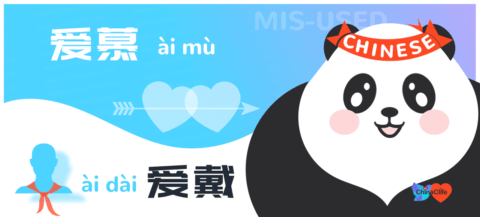How to Turn English Sentences into Short Chinese?
Series 2: Two-Character Chinese Sentences
中文短句系列(二):仅两字常用句
How about starting your Chinese learning by exploiting the power of two-character Chinese sentences? Let's continue the series of short Chinese sentences and words for Chinese language study. Most short Chinese sentences and words below are used frequently and common to hear and speak in daily communications. Take a view of their writings in Simplified Chinese and Chinese Pinyin carefully for practice. They are not much harder than that you thought.
Target Story Words
English Words:
Chinese Pinyin:
Standard Chinese:
Similar Chinese Words:
短句 duǎn jù Short sentences in Chinese.
日常语 rì cháng yǔ Common sentences for daily use.
Related Chinese Words:
聊天用语 liáo tiān yòng yǔ Sentences used for chatting and communication.
流行语 liú xíng yǔ Buzzwords.
Table of Story
- Story Word in EN/CN/Pinyin
- Listen to Chinese Pronunciation
- #1 "Slow down" into Chinese
- #2 "Take care" into Chinese
- #3 "Be careful" into Chinese
- #4 "Watch out" into Chinese
- #5 "Don't move" into Chinese
- #6-10 More Include: "Bottoms up!", "What about you?", "It's enough!", "Nonsense!", "Move out of my way!" into short Chinese (For Logged-ins)
- Full List of Above (For Logged-ins)
- The Next May Interest You
- Share & Comment
"Take care!" - Short Chinese Farewell
保重!
保重 - (Bǎo zhòng) - "Take care" in short Chinese
It's often to hear that someone says " Take care! " at the end of the conversation, especially at the airport, to say farewell to a friend or colleague who is about to set off. As the most common English farewell sentence, "Take care!" certainly gets its corresponding Chinese short sentence, that is, 保重!, in a hope that others could protect and take good care of themselves, implying the best wishes of good health.
与好友或同事道别时,比如在机场送别对方,常用“Take care!”,在在中文里也有对应的道别语为“保重!”,表达祝愿对方保护和照顾好自己,保重身体的含义。
"Be careful" In Short Chinese
小心!
小心 - (Xiǎo xīn) - "Be careful!" in Short Chinese
当心 - (Dāng xīn) - "Be careful!" in Short Chinese
Generally speaking, "Be careful" is often used to remind others to focus their attention on something. It is usually translated into short Chinese as 小心 or 当心, both of which metaphorally implies to put and concentrate something on your heart because the heart - 心 (xīn) - is the vital organ for the human being.
一般场合中,提醒别人将注意力集中到某件事情上时,常用“Be careful!”或“Be careful with something”,在中文里对应的常用句为“小心”、“当心”、或“留意”。“小心”和“当心”均包含一个“心”字,指向人体最重要的器官“心脏”,因此,这两句中文都暗指将某事放在心上。
Or literally, "Be careful" is also linking with the short Chinese 留意 which means to pay attention to something.
而“留意”是更书面语化的对应中文短句,意指将你的注意力“意”放到某件事上。
"Watch out!" In Short Chinese
小心!
小心 - (Xiǎo xīn) - "Watch out!" in Short Chinese, used for warning in an emergency.
当心 - (Dāng xīn) - "Watch out!" in Short Chinese, used for warning in an emergency.
Be aware of the same short Chinese 小心 or 当心 corresponding to two different English-common sentences "Be careful!" and "Watch out!", which make it easier for you to remember and flexible to use in daily life.
“Watch out!” 和 “Be careful!”在中文里都是“小心”、“当心”的意思,容易记忆,用法灵活。
"Don't move" into Short Chinese
别动!
别动 - (Bié dòng) - "Don't move" in short Chinese
不许动 - (Bù xǔ dòng) - "Don't move" in short Chinese
We can use one Chinese character 别 (bié) to express the meaning of "Don't" or "Do not" in Chinese. Actually, it's able for us to add 别 in front of the most Chinese verbs to indicate its negative meanings or opposite behaviors, e.g.
别说话 (bié shuō huà) (don't speak),
别动 (bié dòng) (don't move), etc.
若用一个汉字表示英文里的 “Don't” 或 “Do not”,可以用"别"字。事实上,我们可以在大部分汉语动词前面加上“别”字来表示否定 或相反的行为,比如“别说话”、“别动”等。
Additionally, to replace the one character 别 with a two-character Chinese word, then come similar words like 不许 (bù xǔ) or 不准 (bù zhǔn) in Chinese, e.g. 不许动 (bù xǔ dòng) or 不准动 (bù zhǔn dòng) both correspond to 别动.
你也可以将“别”字替换成两个汉字如“不许”、“不准”来表示相同的意思,如“别动”等同于“不许动”或“不准动”。
Thanks for reading! More Chinese sentences on the way...
Questions & Additional
Have you got any tips from this bilingual Chinese story above?
Do you have any other questions or suggestions?
You are free to write it down in the "Comments" section below or in our groups.
Any thought from you is appreciated, valuable, and might help the rest of the residents on the planet. 😀
Additionally...
Did You Start Learning Chinese with Pinyin?
Continue to read our User-friendly Chinese-Pinyin version of this story
(Unlocked for Free Logged-in and Premium residents only).
Hope it Helps! : )
























